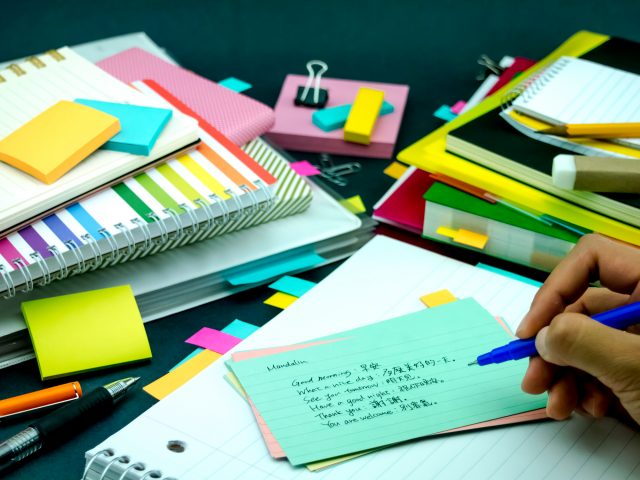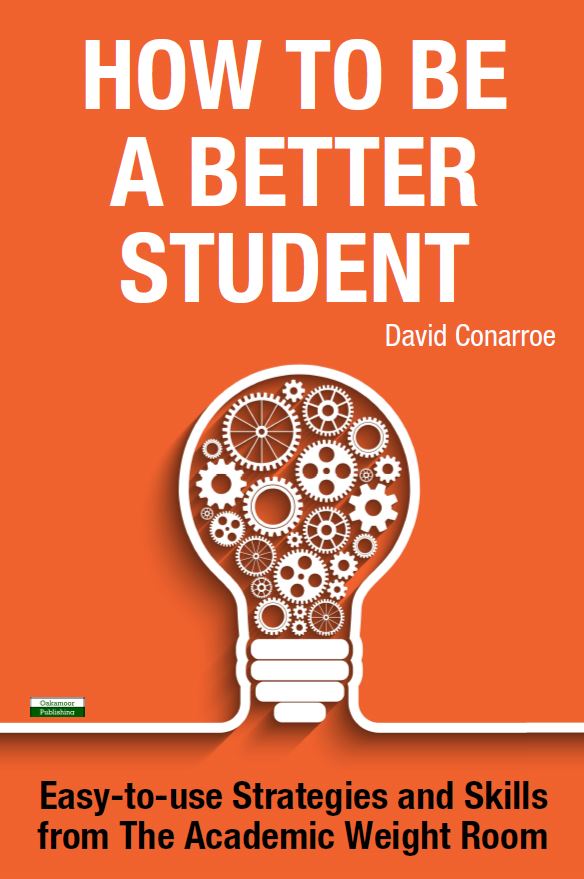Utilizing flash cards will do more to enhance your academic infrastructure, improve your knowledge, and prepare you for an exam than any other strategy.
Recently I had the opportunity to chat with a former student about what I was doing now that I had retired. I told him about the Academic Weight Room project and as we discussed what the project includes, I touched upon how valuable flashcards are in the learning process. He interrupted, “Oh flashcards are a necessity when you are sitting for the series seven exam.” He went on to explain how important this strategy was in his own post-university advancement in investment banking. Indeed, almost every professional career requires some sort of examination which demands complete understanding of terminology and concepts. Flashcards are the most efficient way to embed such knowledge and ace any exam.
How to Create and Use a set of FlashCards
As Medina says, repeat to remember. And as Brown says, space your study out and study all classes simultaneously. Self quizzing (during every day of term time) using the Leitner flashcard system recommended by Brown is the most efficient and effective way to meet this objective.
To put this system into practice, get three 3×5 card boxes and a bunch of 3×5 file cards; you can also use jumbo clips instead of boxes to hold together each deck/box of cards. My version of flashcard utilization is a variation of the system Brown recommends in his book. Students who already use flashcards generally have a separate set of cards for each class, but Brown’s research says to put all cards for all classes into one deck.
The key to doing well in any discipline is to know and understand the language of that discipline, which is simply a function of the terminology. As you memorize and assimilate that terminology, or language, into your daily life, your understanding grows. And according to both Medina and Brown, the best way to accomplish this assimilation is through the use of flashcards.
As I wrote in Chapter 7, the before-class routine for each class requires you to create a flash card for each important concept or term covered in the text or lecture. Again, you use both the professor’s PowerPoint and your textbook as the source of any terminology you need to know. Of course, the term goes on one side and the definition goes on the other and is done as part of the BC/Before Class routine. And remember to put the page number or source of the definition on the card. All cards from all classes go together; don’t separate them to study each class independently.
You could also create flashcards for ANY information you need to remember and which you will be tested on; for example, if you are having trouble with terminology from practice – such as offensive or defensive plays/calls – create cards for those plays, terms, signals, or calls. And, as I have said previously, it might help to color code the top of the card according to your class in case you want to pull out all the cards for one class for a quick review right before an exam.
Box/Deck 1. Don’t Know It
Into box/deck 1, put all the cards you have created for that day’s class/lecture and any other activities for which you need to be able to recall information. The next day, after class, go through the cards by yourself or with a teammate, roommate, friend, academic coach, or tutor. If you know the correct answer/definition immediately, put that card into box/deck 2, which contains the information you seem to know after a couple of days. If you make a mistake or simply cannot recall the answer, leave the card in box/deck 1. You should go through box/deck 1 every day, as you are constantly adding new material/cards from classes you attend every day. Going through this don’t know box/deck can be done in 10 to 20 minute intervals during the day or at your dedicated after class study location, as long as you get through the complete deck once every day.
Box/Deck 2. Know It
You should go through box 2 every three days or so, say every Wednesday and Saturday. If you cannot recall the correct answer when you quiz yourself out of box/deck 2, move the card to box/deck 1, but if you recall the information correctly, move the card to box/deck 3.
Box/Deck 3. Got It
You quiz yourself from the cards in box/deck 3 once a week, say every Sunday night. If you cannot recall something that is in box/deck 3, you must move it all the way back to box/deck 1 so you can get more coverage. However, if you know the information on the card in box/deck 3, leave it until next week. Your goal is to have everything you need to know moved into box/deck 3 by the final exam.
Conclusion
This chapter provided you with a detailed explanation of how to create and use flashcards. This one component of your academic skills infrastructure might do more than anything else to improve your knowledge and performance and is perhaps the most important part of the three study skills routines previously discussed. In earlier chapters, I introduced the idea of the flashcard but reserved the details until now, simply because this skill set is so crucial.
The next chapter changes pace slightly as I talk about the importance of questions. While a teacher or professor might use a shared inquiry or Socratic Seminar approach (which is arguably the most beneficial for students) it is also likely to be the one with which students are least familiar. I think this is because it is the most difficult to put into practice for most teachers in most schools, perhaps due to the simple constraints of large class sizes.
It is my intention to help you to understand how to question by first explaining in detail how the teacher in the shared inquiry classroom organizes the topic around questions and enhances your learning by forcing you to think about both the question and the answers provided by everyone in the class. In the end, this will help you to become a better questioner, improving your critical thinking skills!
Chapter 11 References/Sources
Brown, Peter; Roediger, Henry & McDaniel, Mark. Make it Stick: The Science of Successful Learning. Belknap Press of Harvard University Press. Cambridge, MA. 2104
***


